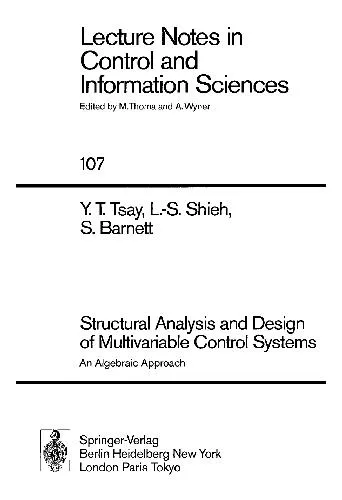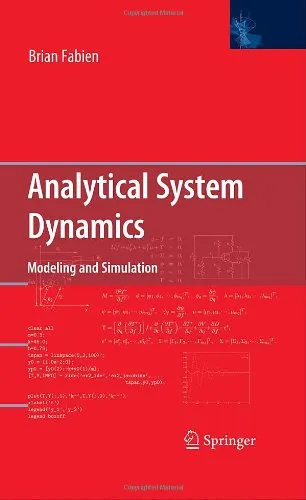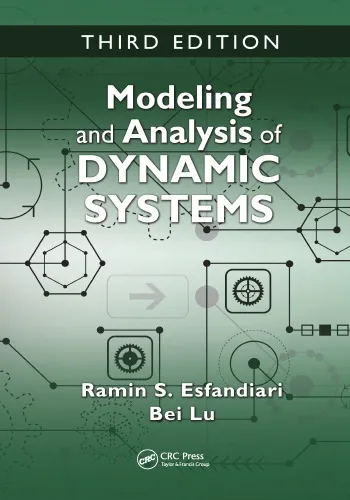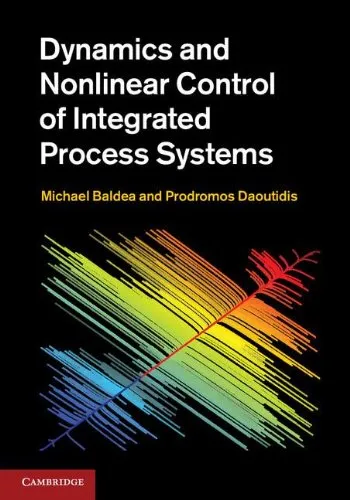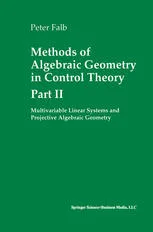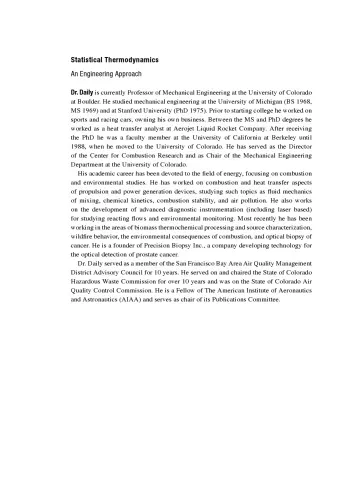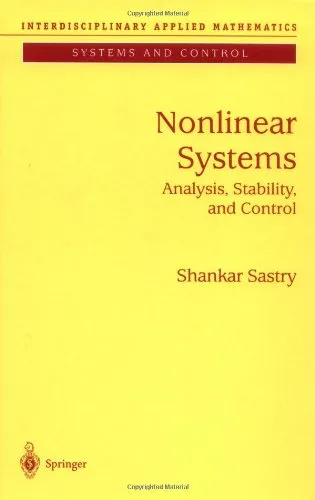Structural analysis and design of multivariable control systems: an algebraic approach
4.0
بر اساس نظر کاربران

شما میتونید سوالاتتون در باره کتاب رو از هوش مصنوعیش بعد از ورود بپرسید
هر دانلود یا پرسش از هوش مصنوعی 2 امتیاز لازم دارد، برای بدست آوردن امتیاز رایگان، به صفحه ی راهنمای امتیازات سر بزنید و یک سری کار ارزشمند انجام بدینکتاب های مرتبط:
معرفی جامع کتاب "Structural Analysis and Design of Multivariable Control Systems: An Algebraic Approach"
کتاب Structural Analysis and Design of Multivariable Control Systems: An Algebraic Approach یکی از مراجع برجسته و کلیدی در زمینه تحلیل و طراحی سیستمهای کنترل چندمتغیره است. این کتاب به شیوهای اصولی و ساختاریافته به بررسی مفاهیم پیچیده و تکنیکهای پیشرفته در کنترل سیستمی میپردازد و یکی از منابع ارزشمند برای دانشجویان، پژوهشگران، و مهندسان حرفهای در این حوزه میباشد.
اثر حاضر توسط نویسندگان Yih T. Tsay، Leang-San Shieh و Stephen Barnett نگارش یافته و با تمرکز بر رویکرد جبری، راهکارهای علمی و عملیاتی پیشرفتهای برای مطالعه و تحلیل سیستمهای کنترل چندمتغیره ارائه داده است. به دلیل ماهیت پیچیده این سیستمها، کتاب در تلاش است تا با استفاده از اصول ریاضیاتی و کاربرد مباحث جبری به فهم آسانتر موضوعات کمک کرده و چارچوبی تئوری و عملی فراهم آورد.
خلاصهای از محتوای کتاب
این کتاب دیدگاه جامعی نسبت به جنبههای ساختاری سیستمهای کنترل چندمتغیره ارائه میدهد. در اینجا به برخی از مباحث اصلی مطرحشده در کتاب اشاره میکنیم:
- تحلیل ساختار سیستمهای چندمتغیره
- طراحی و بهینهسازی سیستمها با استفاده از ابزارهای مقدماتی و پیشرفته جبر
- رویکردهای نوین در طراحی سیستمهای کنترل Feedback
- بحث در مورد Robustness و پایداری سیستمها
- مطالعه تکنیکهای طراحی بهینه برای کنترلکنندههای خطی و غیرخطی
هر فصل از این کتاب بهگونهای تدوین شده که خواننده بتواند با عبور از مباحث ابتدایی به مفاهیم عمیقتر و تخصصیتر برسد و درک مناسبی از رفتار سیستمهای پیچیده چندمتغیره حاصل نماید. این اثر همچنین شامل مثالها و تمرینهای کاربردی است که درک مفاهیم را برای خواننده آسانتر میسازد.
موارد کلیدی که در این کتاب خواهید آموخت
- چگونگی استفاده از نظریههای جبری برای تحلیل و طراحی سیستمهای کنترل
- راهحلهای سیستماتیک برای حل مسائل پیچیده کنترل چندمتغیره
- مفاهیم پایداری و Robustness و اهمیت آنها در طراحی سیستمها
- چگونگی بهبود عملکرد سیستمها با استفاده از ابزارهای جبری
- آشنایی با چالشهای طراحی کنترلکننده در سیستمهای چندمتغیره
نقل قولهای برجسته از کتاب
“The algebraic approach not only simplifies the analysis but also provides a unified framework to characterize various complex behaviors in multivariable systems.”
“Understanding the structural interactions within a multivariable control system paves the way for designing robust and optimal controllers.”
چرا این کتاب اهمیت دارد؟
این کتاب به دلایل متعددی یکی از مراجع ارزشمند در زمینه کنترل چندمتغیره به حساب میآید:
- رویکرد منحصر به فرد آن در استفاده از جبر برای تحلیل و طراحی سیستمها
- ایجاد پیوند بین نظریه و کاربرد عملی در دنیای واقعی
- ارائه دیدگاهی جامع که مبانی تئوری و روشهای عملی را پوشش میدهد
- وجود تمرینها و مثالهای واقعی که یادگیری را تسهیل میکنند
- ارائه چارچوبی کارآمد برای مطالعه سیستمهای چندمتغیره که چالشهای نوین مهندسی را پاسخگوست
اگر شما یک دانشجو یا محقق در زمینه کنترل و یا مهندسی سیستمها هستید، این کتاب یک منبع ضروری است که دانش شما را ارتقاء خواهد داد و درک بهتری از سیستمهای چندمتغیره و چالشهای مرتبط با آنها فراهم میآورد.
Introduction to "Structural Analysis and Design of Multivariable Control Systems: An Algebraic Approach"
"Structural Analysis and Design of Multivariable Control Systems: An Algebraic Approach," authored by Yih T. Tsay, Leang-San Shieh, and Stephen Barnett, is a comprehensive treatise that delves deeply into the theory, structural framework, and practical methodologies for designing multivariable control systems. This fundamental text is designed to equip engineers, researchers, and students with the necessary tools to understand and solve complex control system problems using algebraic techniques. It focuses heavily on exploring how algebra and systems theory intersect to provide an innovative and systematic approach to analyzing and designing control systems.
By framing control problems through the lens of linear algebra and matrix theory, the book offers fresh perspectives and insightful solutions for practitioners in engineering disciplines. Expounding both theoretical developments and engineering applications, the authors expertly balance mathematical rigor with practical examples to bridge the gap between abstract theories and hands-on design challenges. Whether you're delving into the structural aspects of system control or designing effective controllers for multivariable systems, this book lays down a strong foundation supported by a wealth of practical guidance.
Detailed Summary of the Book
The book starts with an in-depth exploration of the fundamental principles underlying multivariable control systems. It explains the structural aspects of control systems by leveraging algebraic concepts such as linear algebra, matrix polynomials, and factorization techniques. One of the key objectives of the text is to provide a clear theoretical foundation for the analysis and design of multivariable systems while addressing various aspects of controller synthesis and feedback design.
Early chapters introduce the core mathematical tools required to build a foundational understanding of control system analysis—these include state-space representations, transfer matrices, and the roles of controllability and observability in system behavior. Special attention is given to structural properties, such as the pole-zero placement and their impacts on system stability and performance.
As the book progresses, it delves into methods for designing controllers and observers that work harmoniously within a multivariable control setting. Techniques such as state feedback, observer-based control design, and disturbance decoupling are thoroughly covered, with each method being analyzed for robustness and practical implementation. Additionally, emphasis is placed on systems with inherent interdependencies, highlighting the challenges posed by multivariable interactions and how they can be mitigated through a structured approach.
A distinctive attribute of this work is the algebraic perspective it adopts. By employing tools like polynomial matrix equations, Smith-McMillan forms, and coprime factorization, the authors underscore the elegance and utility of solving control problems algebraically. The latter chapters address advanced topics, including optimal control, linear quadratic regulator (LQR) designs, and predictive control, further expanding the arsenal of techniques that can be applied to deal with modern engineering problems in control systems.
Key Takeaways
- A robust foundation in the mathematical underpinnings of multivariable control systems.
- Detailed insights into the structural properties of dynamic systems using an algebraic framework.
- Practical methodologies for controller design, including state feedback and observer design.
- Advanced control design techniques such as optimal control and disturbance rejection.
- Applications of polynomial matrix equations and factorization methods in real-world design challenges.
- Balanced treatment of theoretical foundations and real-world engineering applications for modern industrial needs.
Famous Quotes from the Book
"A control system is only as robust as the algebraic tools that define its structural integrity."
"The elegance of algebra lies in its ability to simplify the complex interdependencies inherent in multivariable systems."
Why This Book Matters
In a world increasingly dependent on advanced engineering solutions, the design and analysis of control systems play a pivotal role in ensuring the safety, efficiency, and reliability of modern technologies. "Structural Analysis and Design of Multivariable Control Systems: An Algebraic Approach" offers a groundbreaking contribution by merging the sophistication of multivariable control theory with the mathematical precision of algebra.
Its distinctive algebraic approach provides readers with a powerful toolkit for tackling some of the most challenging issues in systems engineering—enhancing not only their technical skills but their conceptual understanding of structural dynamics and stability. Unlike conventional texts, which often focus solely on computational techniques, this book delivers a deeper appreciation of the underlying structures that govern system behavior.
For students, seasoned engineers, and researchers alike, the book imparts valuable practical knowledge and analytical capabilities that are indispensable for addressing the multifaceted demands of modern control systems. Its relevance spans academic research, industrial control applications, and even emerging areas like robotics and autonomous systems. By coupling mathematical depth with a pragmatic focus, this book ensures that readers are not only equipped to excel technically but are also inspired to push the boundaries of engineering innovation.
دانلود رایگان مستقیم
شما میتونید سوالاتتون در باره کتاب رو از هوش مصنوعیش بعد از ورود بپرسید
دسترسی به کتابها از طریق پلتفرمهای قانونی و کتابخانههای عمومی نه تنها از حقوق نویسندگان و ناشران حمایت میکند، بلکه به پایداری فرهنگ کتابخوانی نیز کمک میرساند. پیش از دانلود، لحظهای به بررسی این گزینهها فکر کنید.
این کتاب رو در پلتفرم های دیگه ببینید
WorldCat به شما کمک میکنه تا کتاب ها رو در کتابخانه های سراسر دنیا پیدا کنید
امتیازها، نظرات تخصصی و صحبت ها درباره کتاب را در Goodreads ببینید
کتابهای کمیاب یا دست دوم را در AbeBooks پیدا کنید و بخرید
1384
بازدید4.0
امتیاز0
نظر98%
رضایتنظرات:
4.0
بر اساس 0 نظر کاربران
Questions & Answers
Ask questions about this book or help others by answering
No questions yet. Be the first to ask!
